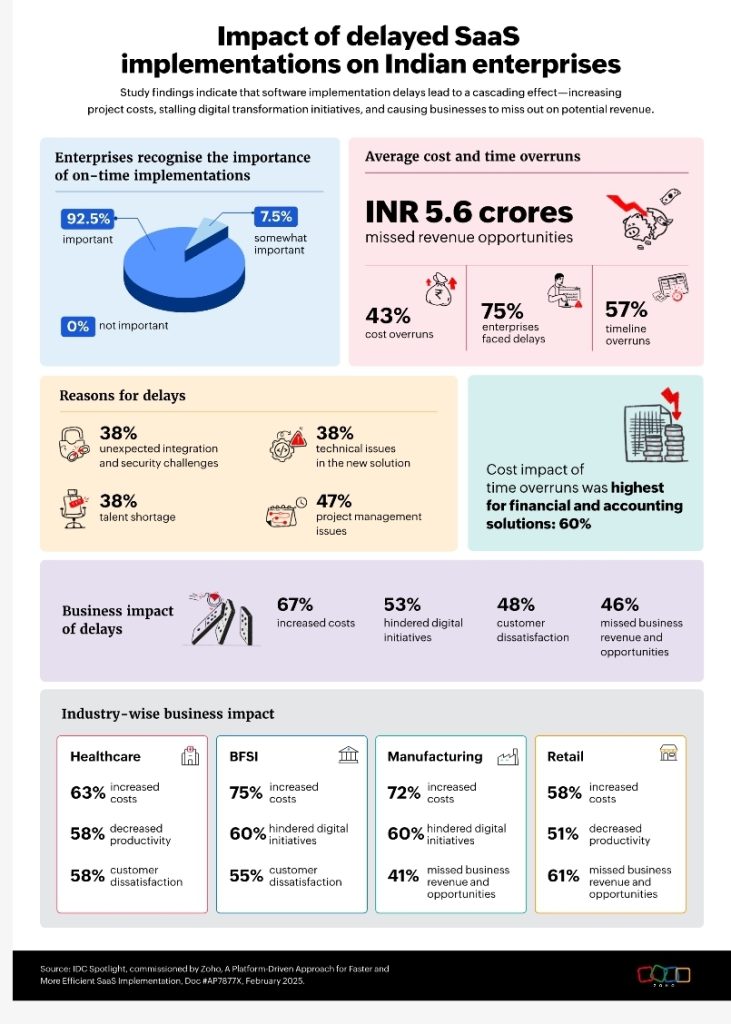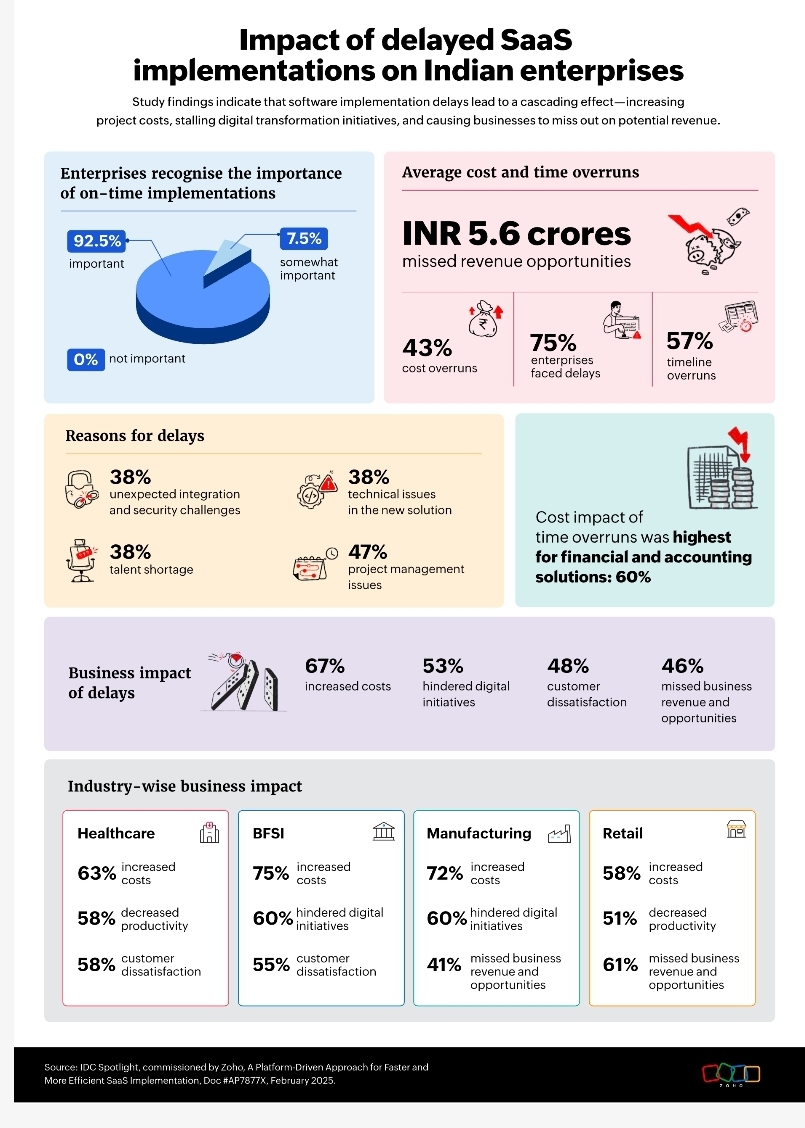The Hidden CX Crisis: How SaaS Implementation Delays Are Costing Indian Businesses
Introduction
Customer experience (CX) drives business success. Every digital transformation effort aims to improve service, enhance efficiency, and create seamless customer interactions. However, many businesses face a hidden crisis—SaaS implementation delays. These delays don’t just disrupt operations; they frustrate customers, reduce engagement, and lead to lost revenue.
A new IDC study, commissioned by Zoho, reveals the staggering impact of SaaS implementation delays. 75% of Indian enterprises that adopted SaaS solutions since 2020 faced deployment overruns. On average, projects exceeded timelines by 57% and budgets by 43%. Worse, businesses lost ₹5.6 crore in missed opportunities.
For customers, these delays mean slow service, poor communication, and inconsistent experiences. For businesses, they mean lost revenue, decreased loyalty, and reduced competitiveness. This article explores how these delays affect CX and how companies can overcome them.
Why SaaS Delays Hurt Customer Experience
1. Slow Deployments Lead to Frustrated Customers
When a business invests in SaaS, customers expect faster, more efficient service. However, delays prevent companies from delivering on this promise. According to the study, 48% of enterprises reported customer dissatisfaction due to SaaS implementation issues.
For instance, a retail business adopting a new CRM might face deployment delays. Without proper customer data access, support teams struggle to personalize interactions. As a result, customers experience slow responses, unresolved issues, and disengagement.
2. Missed Revenue Opportunities Affect Customer Loyalty
Delayed SaaS projects don’t just increase costs—they also reduce revenue. The study found that 46% of enterprises suffered financial losses due to implementation setbacks.
A financial services company implementing an upgraded payment processing system might encounter delays. Customers face failed transactions, longer processing times, and inconsistent billing experiences. Eventually, they switch to competitors offering seamless payments.
3. Disruptions in Digital Transformation Reduce CX Efficiency
A smooth customer experience depends on well-integrated digital systems. However, 53% of enterprises in the study said delays disrupted their digital transformation efforts.
For example, a healthcare provider might adopt BI and analytics solutions to enhance patient care. But delays in implementation force staff to rely on manual processes, increasing wait times and errors. Patients experience longer appointment booking times, billing issues, and uncoordinated care.
4. Increased Costs Reduce Investment in CX Innovations
Overruns in SaaS implementations force businesses to divert resources. 67% of enterprises reported higher costs due to prolonged deployment timelines. When budgets stretch, businesses cut investments in CX-enhancing innovations.
A manufacturing firm deploying a new HRMS platform might exceed budget due to delays. Instead of investing in employee experience improvements, the company shifts focus to damage control. Employees remain frustrated, and service quality declines.
Industry-Specific CX Impact
Healthcare: Delayed Implementations Affect Patient Experience
Healthcare businesses rely on CRM, BI, and F&A solutions to streamline operations. However, 63% of healthcare enterprises faced cost overruns, and 58% reported reduced productivity due to delays.
A hospital implementing a new patient management system might experience deployment setbacks. Without an integrated system, patients wait longer for test results, prescriptions, and billing. Frustration grows, and trust in the hospital declines.
Financial Services: Delayed Upgrades Hurt Customer Trust
In financial services, CRM, F&A, and email solutions saw the highest adoption. However, 75% of enterprises reported increased costs, while 55% experienced customer dissatisfaction due to slow deployments.
Imagine a bank upgrading its fraud detection system. A delayed rollout could mean slower fraud identification, leading to more unauthorized transactions. Customers feel unsafe, lose confidence, and move to more reliable banks.
Retail: Revenue Losses Due to Poor Customer Experience
Retailers, especially those leveraging ONDC, depend on CRM, F&A, and collaboration tools. However, 61% reported revenue losses, and 58% faced higher costs due to SaaS implementation delays.
For instance, an e-commerce platform introducing a new customer support chatbot might face deployment delays. Customers struggle to get real-time support, leading to abandoned carts and reduced brand loyalty.
Why SaaS Implementations Are Delayed
The study identified several reasons for implementation setbacks:
- Project management inefficiencies (47%)
- Unexpected integration and security challenges (38%)
- Talent shortage (38%)
- Technical complexities (38%)
Many businesses assume customer experience solutions require minimal customizations. However, 87% of enterprises implementing CX solutions post-pandemic faced 51% timeline overruns. Even email and collaboration tools saw 68% time overruns, the highest among all categories.
How Businesses Can Accelerate SaaS Deployments and Improve CX
1. Adopt a Platform-First Approach
A platform-driven SaaS strategy streamlines deployments. By leveraging pre-configured workflows, AI-powered automation, and seamless integrations, businesses can reduce implementation risks.
Zoho’s platform architecture allows enterprises to:
- Implement solutions at scale with minimal disruptions
- Utilize plug-and-play integrations for faster go-live
- Reduce customization needs using low-code and no-code tools
2. Automate Processes to Minimize Delays
59% of enterprises in the study acknowledged that automation and DevOps practices shorten deployment timelines. Automation reduces manual dependencies, lowers error rates, and accelerates SaaS rollouts.
For example, financial firms deploying F&A solutions can automate workflows for faster invoice processing, approvals, and compliance checks, improving customer satisfaction.
3. Empower Business Users with Low-Code and No-Code Solutions
The study found that 53% of enterprises believe integrated developer platforms help overcome customisation bottlenecks. By enabling business users to build and modify applications without excessive coding, delays shrink significantly.
For instance, a retail company launching a loyalty program can quickly create a custom rewards tracking app using a low-code platform. Customers experience a seamless rewards system, increasing engagement.
4. Focus on Seamless Interoperability
Poorly integrated solutions slow down deployments. 48% of enterprises emphasized the importance of plug-and-play solutions that simplify integrations.
For example, a B2B SaaS provider offering pre-configured APIs can help clients integrate systems faster. As a result, businesses enhance CX without long technical disruptions.
Conclusion
Delayed SaaS implementations hurt businesses by disrupting operations, frustrating customers, and causing revenue losses. In fact, companies that fail to deploy solutions on time risk damaging their brand reputation and losing customer trust.
To stay competitive, businesses must prioritize fast, efficient SaaS rollouts. By adopting a platform-driven approach, leveraging automation, and using low-code solutions, companies can accelerate deployments and enhance CX.

Ultimately, in the digital era, as a matter of fact, speed matters. In fact, the faster businesses implement SaaS solutions, the better their customer experience—and bottom line—will be.

